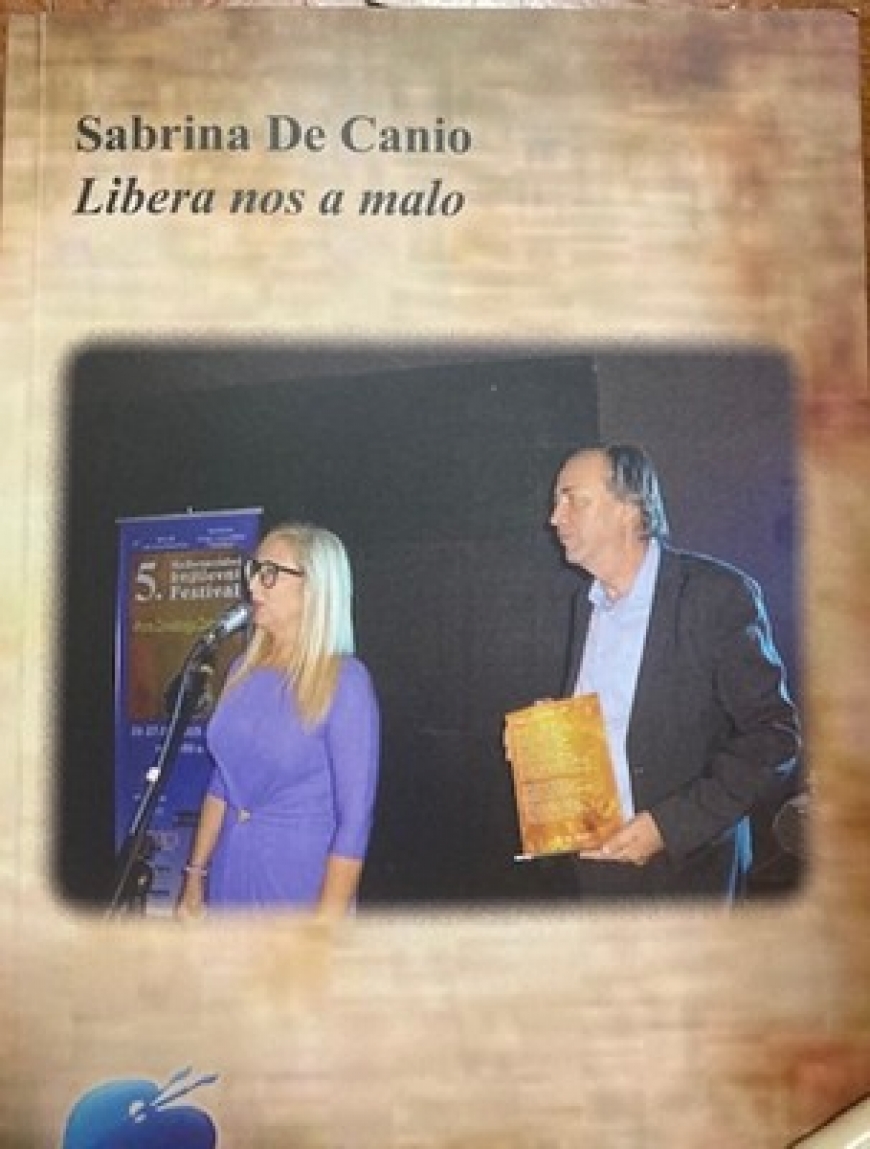Ho conosciuto Sabrina De Canio durante un incontro di poesia in Italia Centrale, durante il quale abbiamo avuto l’occasione di parlare un po' e scambiare libri. Le sue parole mi hanno immediatamente disvelato un forte senso di partecipazione personale al malessere dell’umanità, anche rievocando la guerra in Eritrea, soprattutto negli anni di cui lei è stata testimone diretta: ha lavorato là come insegnante per un decennio. Impegnata in poesia e in politica, è docente di Lingua e Letteratura Italiana nella Scuola Secondaria. In Umbria non c’è stato tempo per molto altro ma posso parlare di questo suo libro che risulta pubblicato non è molto, cinque anni fa in Bosnia, avendo ottenuto un importate riconoscimento in poesia.
Libera nos a malo, editrice Besjeda, Zenica (Bosnia), 2020
Libera nos a malo è parte d’una celebre preghiera, come i cattolici sanno. Liberaci dal male: ma non si dichiara l’appartenenza a una fede piuttosto che ad altra o a nessuna, solo s’intende qui che le situazioni di cui si è testimoni nel mondo (non solo oggi: basta conoscere un po' la storia) sono tali che bisogna raccomandarsi l’anima a un dio, oppure che solo un dio ci potrebbe salvare, come hanno detto.
Ma il fatto è che solo nelle nostre forze possiamo sperare davvero, e nel ben volere degli uomini: può essere poco, e comunque sarebbe improprio pregare. Pertanto “pregare non si può” (58-9), tanto meno ci si può aspettare “omaggio” che “non c’è” alla buona volontà che agisce - piuttosto vigilare, o vegliare, e farsi forza e agire, nonostante la fragilità che risulta dalla visione d'un io
…inciampo d’alfabeti confusi
ferro di volontà in bilico
su ragnatele di sogni
tesi sull’abisso della paura (37).
La fragilità propria dell'individuo è quella dell’umanità tutta, ridotta troppo spesso a
…parata di vagoni
braccia, mani
come bandiere di stracci (…)
Pelli di fantasmi ammonticchiate
senza grazia nei fossi (13).
Il ben volere degli uomini si può chiamare amore, con qualche perplessità e qualche distinguo, perché amore, come bellezza o amicizia, può voler dire troppe cose. Non che qui non sembri presente un “tu” (solo a volte) riferito a qualcuno, ma, in poesia, il “tu” subisce la stessa sorte dell’ “io”, cioè quando la poesia è efficace si pluralizza e si rende universale, immediatamente, senza per questo perdere pregnanza.
Anche gli animali vengono coinvolti nel sentire il dolore universale: è l'immagine del toro in corrida cui vengono attribuiti i versi, rivolti all’uomo, “mi farai morire/per sentirti vivo” (51). Ma non è difficile dire che in questi versi di Sabrina De Canio l’amore tende verso l’umanità in generale e che la prossimità anche fisica alla tragedia dei simili non ha in lei alimentato qualche forma di fuga o evasione ma “solo” condivisione. Così potrei interpretare che muri e barriere (“sbarre”, 55) fanno “corto/il nostro esistere” (ivi), fanno limite ad un esistere che perciò diventa “sguardo interrotto” e “senza intimità” (ivi). Per una condivisione che sia allo stesso tempo intima e fraterna, laddove
Solo la notte,
a volte,
ci copre tutti
con la sua coperta (ivi).
Come qualcuno ha notato, in alcuni versi dell’autrice, anche in questi, si potrebbe ravvisare la presenza d’una poetica precisa che è stata definita del “realismo terminale”. Ma tale riferimento va inteso come soltanto un momento del suo percorso in poesia. Inoltre, per quanto mi riguarda e in generale, considero le figure presenti qui nel libro pressappoco come va pensata l’analogia in poesia, con la relativa forza portante, se cioè sia appropriata e potente, come alcune di queste mi risultano essere. Può sembrare banale ma forse serve dire che, per esempio, la poesia di Saffo non ha la virtù di attraversare i millenni perché a Lesbo v’era un tiaso, di cui quella donna mai dimenticata presumibilmente fu sacerdotessa. L’atmosfera dei luoghi e degli incontri in cui ci troviamo può incentivare la poesia ma solo una esigenza che reca l’impronta dell’anima la può determinare.
(English)
Sabrina De Canio, is acting also praying in poetry? ‘Libera nos a malo’.
…inciampo d’alfabeti confusi
ferro di volontà in bilico
su ragnatele di sogni
tesi sull’abisso della paura (37).
…parata di vagoni
braccia, mani
come bandiere di stracci (…)
Pelli di fantasmi ammonticchiate
senza grazia nei fossi (13).
Solo la notte,
a volte,
ci copre tutti
con la sua coperta (ivi).

